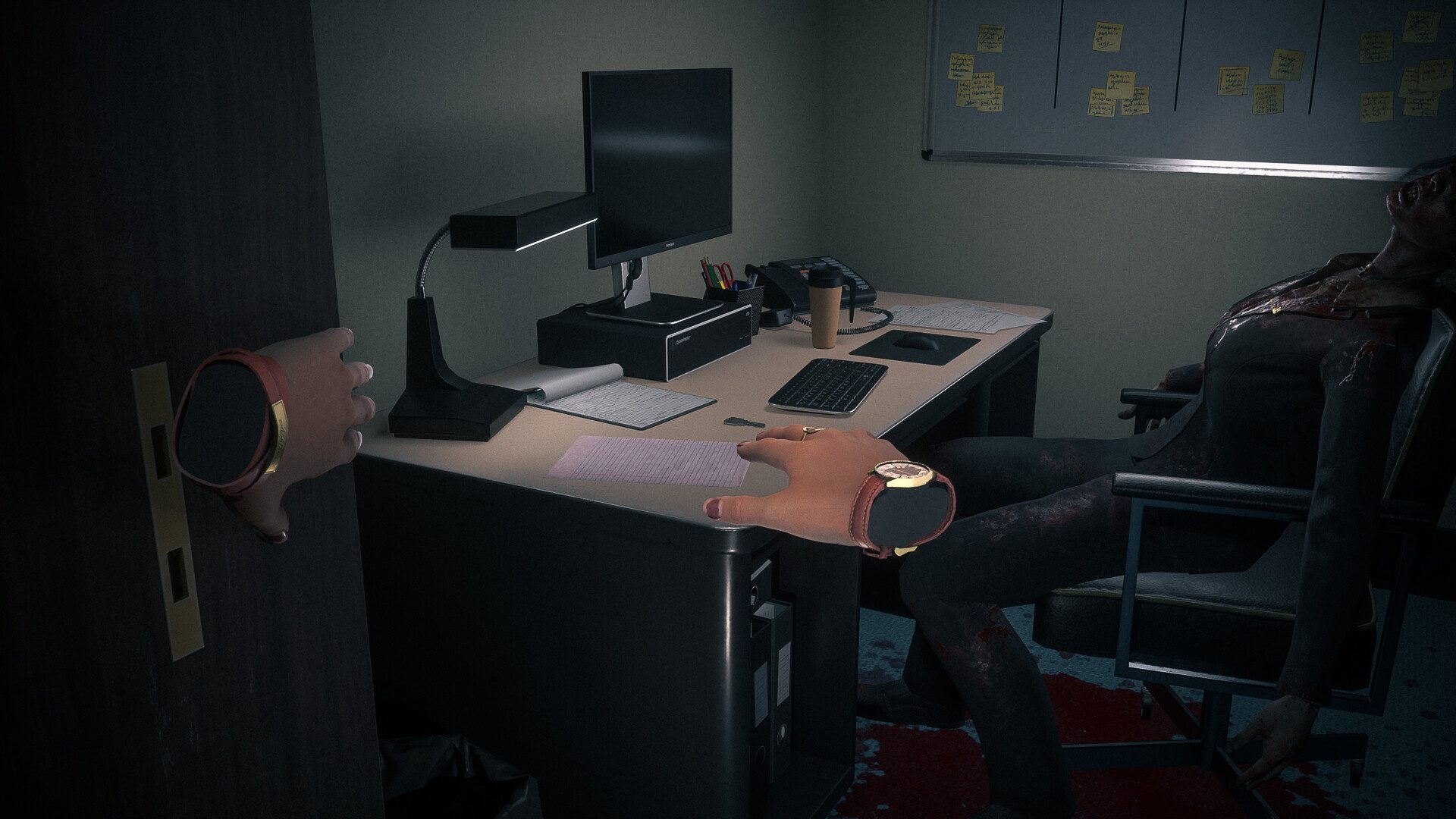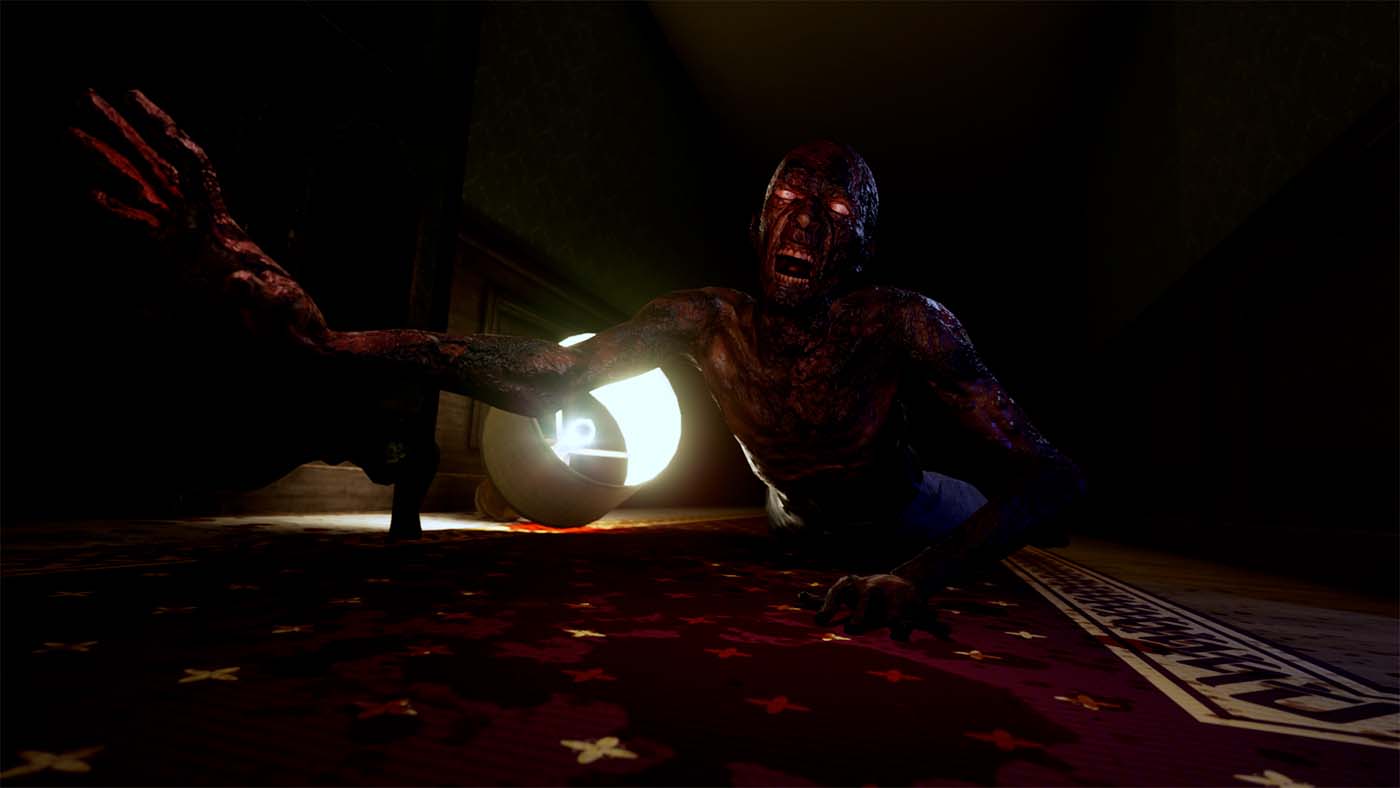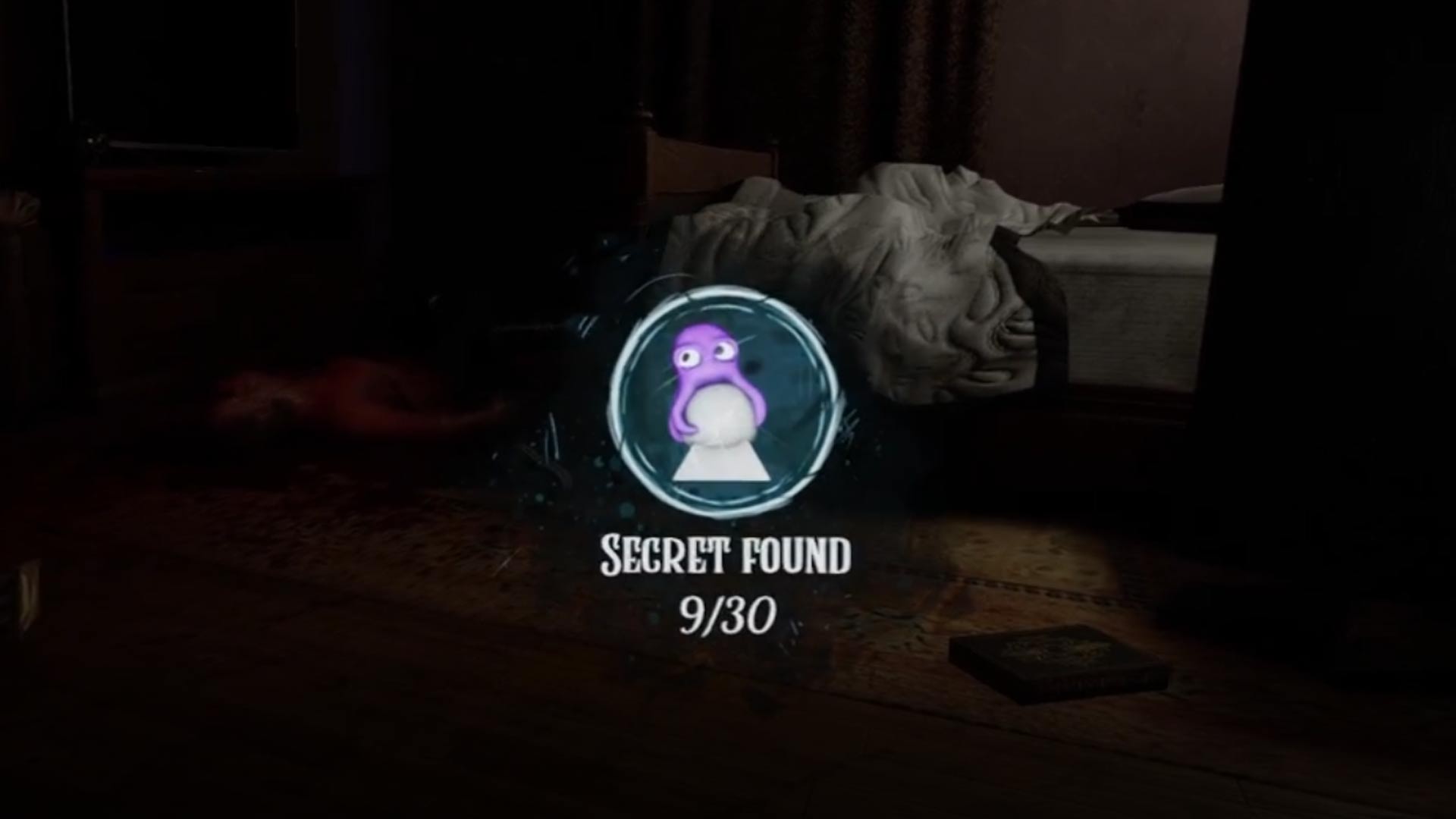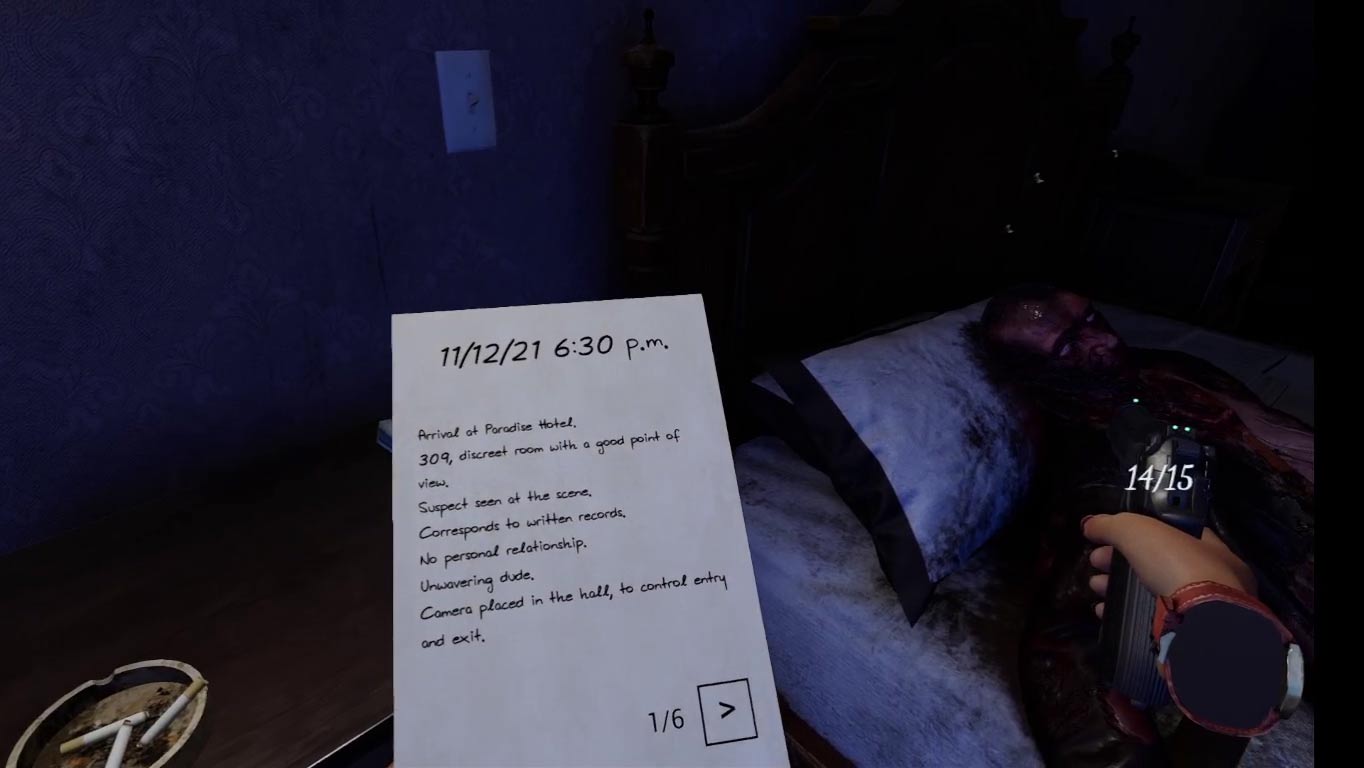Propagation: Paradise Hotel offers some patently terrifying moments of horror, but between the ever-lingering danger of zombified attacks and a few giant bosses—making for a very Resident Evil-inspired experience—there’s a bit of clunk that tarnishes what could have been a more memorable and cohesive experience. Still, it’s functionally a pretty solid zombie adventure that makes a clear departure from the franchise’s roots as a static wave shooter.
Propagation: Paradise Hotel Details:
Available On: SteamVR, Quest
Release Date: May 4th, 2023
Price: $20
Developer: WanadevStudio
Reviewed On: Quest 2 via PC Link
Gameplay
It’s the zombie apocalypse, and you’re bumming around the bowels of a non-descript hotel in some non-descript part of the world. You won’t have a lot of time to hang with your fatherly security guard pal though because you have to go and find your sister, who is gone for some reason. Okay, so the setup isn’t spectacular, but at least the zombie kill’n is pretty good, right? I’ll lead with an emphatic “yeah, mostly!”
Rule number one of zombies: shoot them in the head. That’s the ironclad directive you’re probably most familiar with, but there are some caveats in Propagation: Paradise Hotel. Shooting zombies in the head multiple times with a pistol makes them very sleepy. No, really. Shoot a zombie three times in the head and they’ll quietly lay down on the ground for a while. Sometime later, usually when you’ve tripped another lurch forward in the narrative, he’ll pop back up at a patently inopportune time to bother you once again.
As clear of a departure from zombie orthodoxy this is, the effect it had on me was something I can’t say I’ve felt in a zombie shooter before. Instead of worrying about walkers popping out from the ceiling (there are a few) or shambolically oozing out from closed doors or windows, you become much more fixated on every single corpse laying in the hallway, of which there are many. You aren’t roaming through an infinite hellscape either, as you’ll be backtracking, learning the layout of the hotel, and tip-toeing around zombies whilst pointing a gun in their face, lest they reawaken and start harassing you again.

In effect, any one of them could be waiting for you to lower your guard, open their eyes and grab onto your ankle. Sadly, a preemptive shot in the head is completely ineffectual, which is a letdown in the Immersion department, but more on that below. Just the same, you’ll be cautious because you can’t discount a single corpse, which is a new type of creepy that really kept me on edge. Knowing this, I would have loved the option to cut off some heads to put an end to the contant revisitations, but that’s just not in the cards.
That’s basically the case until you get a shotgun in the latter half of the game, and then those walkers lay down for good because you’ve effectively stumpified their infected brains (finally). What was previously one-on-one battles ramp up to three-on-one battles, putting the game’s only other gun (and most powerful) to the test. You’ll also start to rush through a few new classes of zombie in addition to some more difficult baddies, which offers some interesting variety in difficulty. Will you run into three walkers? One scorpion-style zombie? A ripped dude that can take a ton of shots to the face?

While there are a few difficult and unique zombies, there’s really only one true boss in the game. Full disclosure: I disliked it, and while I won’t spoil anything here, rest assured you’ll probably be frustrated too with how to take him down. He is ultra lame, and you’ll want to mute the game just so you don’t have to hear your character constantly shout ad nauseum “I need to knock him out!”
Ok. No. I will spoil the boss. Skip this paragraph if you want to avoid the spoiler: What does “I need to knock him out” even mean?? Don’t I need to kill this bastard? Do I need to knock him out before I kill him? Is that a hint? Do I need something to do that? Maybe I need to call the elevator and rig up something to knock him out? Maybe I need to escape the lobby and head up the stairs to get something I missed? Maybe I need to explode a fire extinguisher in his face to knock him out? Nope. My hand phases right through those, so it can’t be that. Maybe I need to die a dozen times before I learn he has a specific attack pattern with a singular weak point, hit it three times and meander my way to sequel-bait then the end credits? Yup, that’s it.
Anyway, many of the mechanical bits of Propagation: Paradise Hotel are very functional, and work well. The body-based inventory system isn’t overloaded, so you always have what you need, like a medical spray on your left flank, a flashlight that you can clip to your chest or hold in your hand, your 9mm pistol on your right, or the shogun over your shoulder. It’s all there and easy to grab. This compliments a 2D menu that you can pull up, which as mission-essential items, the map, settings, etc.
It’s not easy changing up a user’s expectation of level design when we all know what to expect more or less in a space as familiar as a hotel. Still, the game throws a few curveballs your way to keep you from mechanically looking through every room in the hotel, which spans seven levels. Still, the story itself didn’t feel like a compelling enough driver to keep you moving forward. The found notes add a little flavor, but don’t do enough to flesh out the background of what’s actually going on, leaving you to mostly just bump your head against each task until its complete so you can move onto the next.
Finally, the game, which took me around 3.5 hours to complete, also includes a few puzzles, although all solutions are published in found notes, so you just have to be thorough in your shelf-opening game.
Immersion
Everything about Propagation looks the part, but very little is actually interactable, making it feel more like a flatscreen game than it probably should. There are a few key items you can pick up and use, but everything else is pure set dressing. I don’t want to underplay just how good the game looks, as it offers a visual acuity and variety that makes each room unique, and not at all the sort of copy-paste experience you’d logically expect from a motif that is basically supposed to look extremely uniform. Still, you can’t grab that fire extinguisher, or even pick up a bottle of detergent. You can only open doors and drawers, and interact with keys, key cards, and important notes.
That already feels pretty gamey enough, but just as things start getting good, you grab for an item and a big achievement pops up to ruin the atmosphere—because apparently you need to be constantly reminded that you just collected nine out of 30 secret items. I’d like my full field of view please, since I’m under constant threat of death and everything.

One of the big narrative drivers is the game’s found notes, and I generally like the mechanic for its ability to either drive the narrative or unobtrusively flavor its back story. In VR, they can be especially immersive since you’re handling something that’s more of a physical artifact than just a bunch of text on a screen. This is where Propagation fails somewhat, as all notes feature a physical ‘next’ button at the bottom that you have to click, making it more like interacting with an eReader than something that was actually written by someone who lived, survived, and maybe even died in the hotel.
Maybe the notes could be shorter? Maybe they could have used the back of the paper? Maybe a different font? Whatever the case, interacting with a piece of paper shouldn’t feel this unnatural in a VR game.

And the wacky unorthodoxy doesn’t stop there. While reloading weapons is a pretty standard experience, the gun’s ammo counter system is definitely not standard. The number indicated isn’t how many bullets you have in the gun, it’s how many are in the magazine. So, if you have 15 bullets in a fresh mag, as soon as you chamber one, the counter says 14.
That’s all well and good for the pistol, but if you forget it when using the shotgun, you may find yourself in deep dog doo-doo as you unintentionally cycle a live round out of the weapon by mistake. Provided you’ve loaded up the shotgun and chambered a round, you may have 3/4 rounds displayed. Once you’re in a tense battle though, and you’re displaying 0/4, you simply can’t be sure whether that 0/4 means you still have one in the chamber, or you don’t. You’ll load back up, shell by shell, until you’re at 4/4 again, but you don’t have any discernible visual indication whether you still have an empty chamber or not, so you cycle the pump just in case. An unspent shell flies out, lands on the floor, and disappears.
While it’s visually interesting and a mostly serviceable shooter despite those inherent flaws, the cherry on the cake is undoubtedly the game’s voice acting, which was clearly farmed out to native French speakers putting on their best American accents. This ranges from “I went to high school in Ohio for a year and picked up the accent pretty well,” to “How do you do, fellow American?” It’s more of an eccentricity than a knock per se, but it leaves me questioning where the hell I am on planet Earth.
Comfort
As a 100 percent walking-based experience that doesn’t include forced locomotion, like on a rollercoaster or similar vehicle, the game proves to be very comfortable, save a single moment when there is some camera shaking. With a wide range of standard comfort options, most everyone will be able to play Propagation: Paradise Hotel without too much issue.
Propagation: Paradise Hotel’ Comfort Settings – May 8th, 2023 |
|
Turning |
|
| Artificial turning | |
| Snap-turn | ✔ |
| Quick-turn | ✔ |
| Smooth-turn | ✔ |
Movement |
|
| Artificial movement | |
| Teleport-move | ✔ |
| Dash-move | ✔ |
| Smooth-move | ✔ |
| Blinders | ✔ |
| Head-based | ✔ |
| Controller-based | ✔ |
| Swappable movement hand | ✔ |
Posture |
|
| Standing mode | ✔ |
| Seated mode | ✔ |
| Artificial crouch | ✔ |
| Real crouch | ✔ |
Accessibility |
|
| Subtitles | Yes |
| Languages |
English, Italian, German, French, Spanish, Japanese, Korean, Portuguese, Russian, Simplified Chinese, Polish |
| Dialogue audio | Yes |
| Languages | English |
| Adjustable difficulty | ✔ |
| Two hands required | ✔ |
| Real crouch required | ✖ |
| Hearing required | ✖ |
| Adjustable player height | ✔ |



